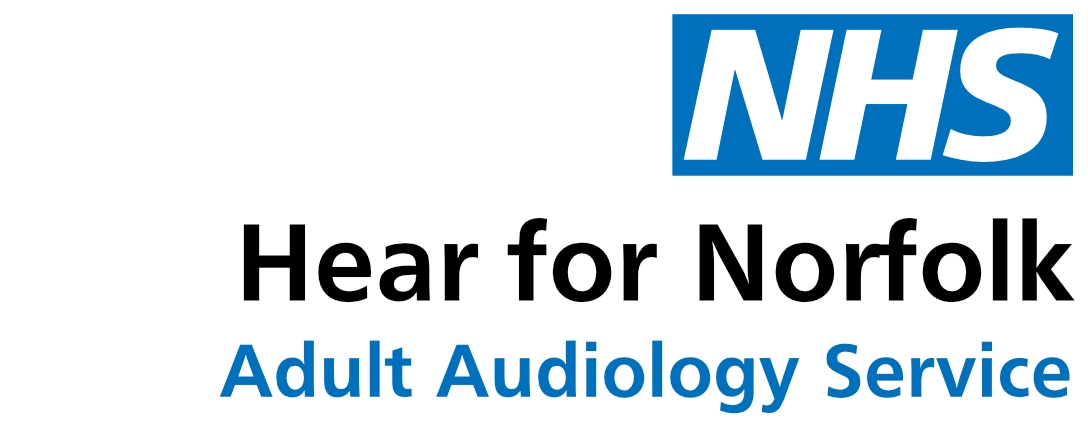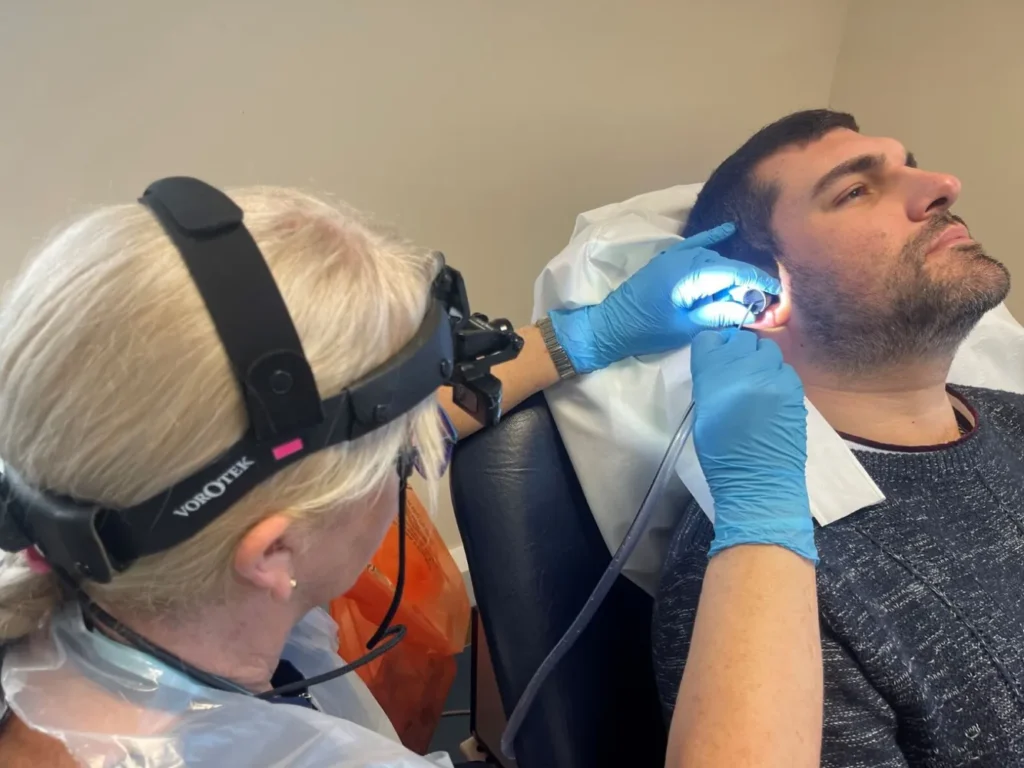Adult Audiology Service
What is hearing loss?
Hearing loss happens when there is a problem with one or more parts of the ear, the nerves inside the ear, or the part of the brain that controls hearing.
There are four main types of hearing loss:
- Sensorineural hearing loss – where the tiny hair cells in the inner ear (cochlea) are damaged, usually through natural ageing (called presbyacusis) or long periods of exposure to loud noises.
- Conductive hearing loss – where sound can struggle to travel (conduct) through the ear to reach the tiny hair cells in the inner ear.
- Mixed hearing loss – a combination of both types of hearing loss outline above.
- Auditory Processing hearing loss – where the ears can transmit and essentially ‘hear’ sounds ne, but the brain has trouble processing and understanding them.

What are the consequences of hearing loss?
Most hearing loss is caused by the ageing process with about one-third of adults over the age of 65 having some hearing loss. This ageing of the ears usually affects our ability to hear soft, higher frequency sounds which results in the brain only receiving parts of speech thus being able to hear people talking but making it difficult to understand what they are saying.
Poor hearing in adults can have a great impact at both a personal and a societal level. Hearing loss can impair our communication, thus significantly affecting everyday life, causing loneliness, social isolation, loss of independence, low self-esteem, having feelings of anxiety and/or depression and can lead to cognitive decline/onset of dementia.
If you have any of the symptoms of hearing loss outlined on this page, then it is important to get your hearing tested as soon as possible.
What do I need to do to prepare for my appointment
To ensure that you are prepared for your hearing assessment, it is essential that excess wax is removed from your ears as this may prevent the audiologist from viewing your ear canal and eardrum, resulting in the inability to perform the hearing assessment.

We are able to check you for the presence of ear wax for free with an appointment at our Otoscopy clinic. You can contact us directly to book an appointment. If the practitioner sees the presence of excess ear wax they will advise you to attend our Aural Care Service (ear wax removal clinic).
You are able to have the ear wax removal procedure free of charge, as an NHS patient, for which we will require a referral from your GP to Hear for Norfolk (Norfolk Deaf Association) or you can contact us directly for an appointment and pay the £50 procedure fee.

How will my hearing be tested?
Our audiologist will carry out tests to find out what type and level of hearing loss you have. Before they begin, they’ll ask you about your hearing and check your ears. They’ll then test one ear at a time. The tests last about 20 minutes and are not uncomfortable. For the standard hearing test, called audiometry, you’ll listen to noises through a set of headphones. You’ll hear sounds of different tones and volumes and will be asked to press a button each time you hear a sound. The noises will gradually become quieter to find the softest sounds that you can hear. The results will be recorded on a chart called an audiogram.
The audiologist might then ask you to wear a headband with a vibrating pad. This pad sends sound through the bones in your head directly to the cochlea (the hearing organ in your inner ear), on both sides of your head. Again, you’ll be asked to press a button each time you hear a sound. This test checks whether the cochlea and hearing nerve are working or damaged. At some point, the audiologist might play a rushing noise into one ear to cover up sounds while they test your other ear.
Why do I need a hearing test?
A hearing test/assessment measures how well you are able to hear. It can be used to find out if you have a hearing problem and if so, how serious it is. You may need a hearing test if you have symptoms of hearing loss.
These include:
- Difficulty in hearing other people clearly or misunderstanding what they say, especially in a noisy environment
- Asking people to repeat themselves
- Listening to music or watching TV with the volume higher than other people need
- Difficulty hearing the phone or the doorbell
- Finding it hard to keep up with conversations
- Feeling tired or stressed from having to concentrate while listening
- Feeling like people are ‘mumbling’
- Experiencing a ‘ringing’ sound in your ears
How Can We Help
Hear for Norfolk is proud to be providing an Adult Audiology Service, which offers NHS funded hearing assessments and hearing aids fitting service to people age 50 and over with age-related hearing loss.
This accessible service is provided by trained, registered and experienced Audiologists and delivered from our community-based clinics. Domiciliary and care home visits are also available for patients that are housebound.
Patients who are registered with Medical Practices in the Central Locality of Norfolk & Waveney ICB are currently able to access our help. There are two ways that you can come to us. You can either speak to your GP and ask them to refer you to Hear for Norfolk for a hearing assessment or you can self-refer by calling us on 01603 404440 or by e-mailing audiology@hearfornorfolk.org.uk.
Making an appointment
For an appointment or more information please call 01603 404440 or email appointments@hearfornorfolk.org.uk or complete the form below.
Patient Feedback
What our service users say
“I just want to thank you SO much for arranging for Hear for Norfolk to see me and sort out my hearing aid problem. I had a wonderful session with the Audiologist on Wednesday and came away with a pair of brilliant hearing aids that work perfectly – and connect to an app I have now installed on my iPhone, which makes me feel very high-tech indeed. The Audiologist couldn’t have been more helpful and explained everything perfectly and very sympathetically. All in all, a much better experience than I’d had with my previous audiologists.”
“Thank you so much for the excellent service my mother received on Monday, for a hearing assessment and the fitting of new aids. The Audiologist was very thorough, and patient. Nothing was too much trouble, everything was explained well, and ensured my mother was happy with everything. Although my mother was very anxious and apprehensive about the appointment beforehand, because of the appalling service we received at the previous company for hearing aids, all nerves soon went with the excellent service received from the Audiologist. My mother can now even hear the clock ticking, the first time in a number of years, so a massive improvement!”
“I would like to take this opportunity to thank you for your help and acknowledge the significant improvement that your diagnosis and hearing aids have had on my day-to-day life. I would be most grateful if you could also pass on my gratitude and appreciation to everyone in the wider team for the wonderful service that you all provide.”
“Just to thank you all for all your kindness today when I collected my new hearing aids which are really great. We are just so lucky to have you looking after us.”







